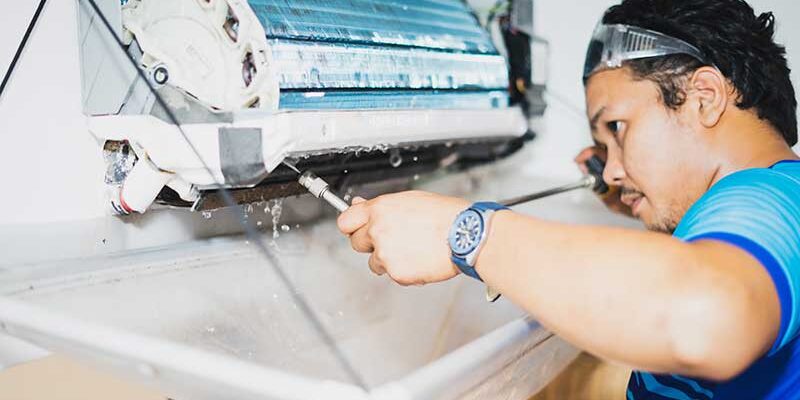Air conditioners are a necessity in many homes, giving comfort and reprieve from the scorching heat of summer. However, just like any other equipment, they are prone to malfunctions, and one common issue that homeowners face is air conditioner leakage. These leaks can cause a variety of difficulties, including water damage and decreased efficiency. In this blog post, we will look at the most common causes of air conditioner leaks, such as clogged drain lines and refrigerant leaks, and explain why they occur and how they can be prevented.
1.Clogged Drain Lines
Clogged drain lines are a frequent cause of air conditioner leakage. Dirt, debris, and algae can collect in drain lines over time, impeding condensate water movement. When the water does not drain properly, it may overflow from the drip pan, resulting in leaks surrounding the unit. Regular maintenance, such as cleaning the drain lines and drip pan, is critical in preventing this problem.
2.Improper Installation
Improper installation of air conditioning units can lead to leakage. If the unit is not installed level or the drain lines are not properly positioned, water may not flow away from the unit as planned, resulting in leaks. Inadequate insulation around refrigerant lines can also create condensation, which leads to water leaks. Ensuring that the device is properly installed by a competent technician can assist prevent this issue.
3.Age-Related Wear and Tear
As air conditioners age, their components may deteriorate, increasing the risk of leaks. For example, worn-out gaskets, seals, or hoses may develop fractures or gaps, allowing water to escape. Similarly, long-term moisture exposure can cause corrosion in the condensate pan or evaporator coil, resulting in leaks. Regular inspections and proactive replacement of worn parts can help to address this issue.
4.Refrigerant Leaks
Refrigerant leaks are a typical source of air conditioner leakage. When refrigerant levels drop owing to leakage in refrigerant lines or components, the evaporator coil may freeze over. As the ice melts, surplus water may overflow from the drip pan, causing leaks. Furthermore, refrigerant leaks might reduce the efficiency and performance of the air conditioner. Quickly detecting and correcting refrigerant leaks is critical for the unit’s good operation.
Air conditioner leaks can be an irritating and costly issue for homeowners. Individuals can take proactive actions to prevent these leaks by recognizing the many reasons, which include clogged drain lines, incorrect installation, age-related wear and tear, and refrigerant leakage. Regular maintenance, appropriate installation, and fast repairs are critical to ensuring the effectiveness and lifetime of air conditioning systems while reducing the possibility of leaks and associated difficulties.




